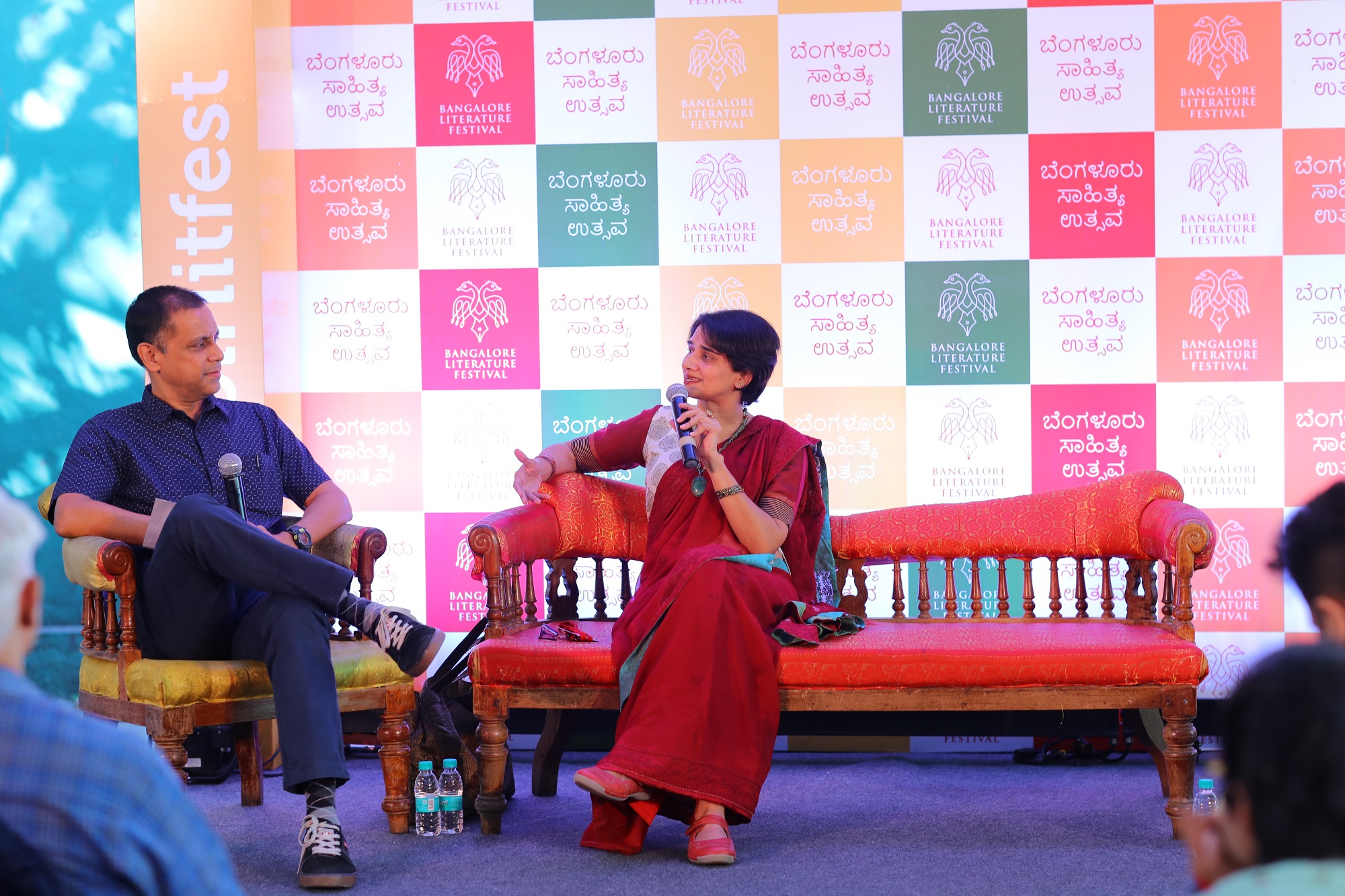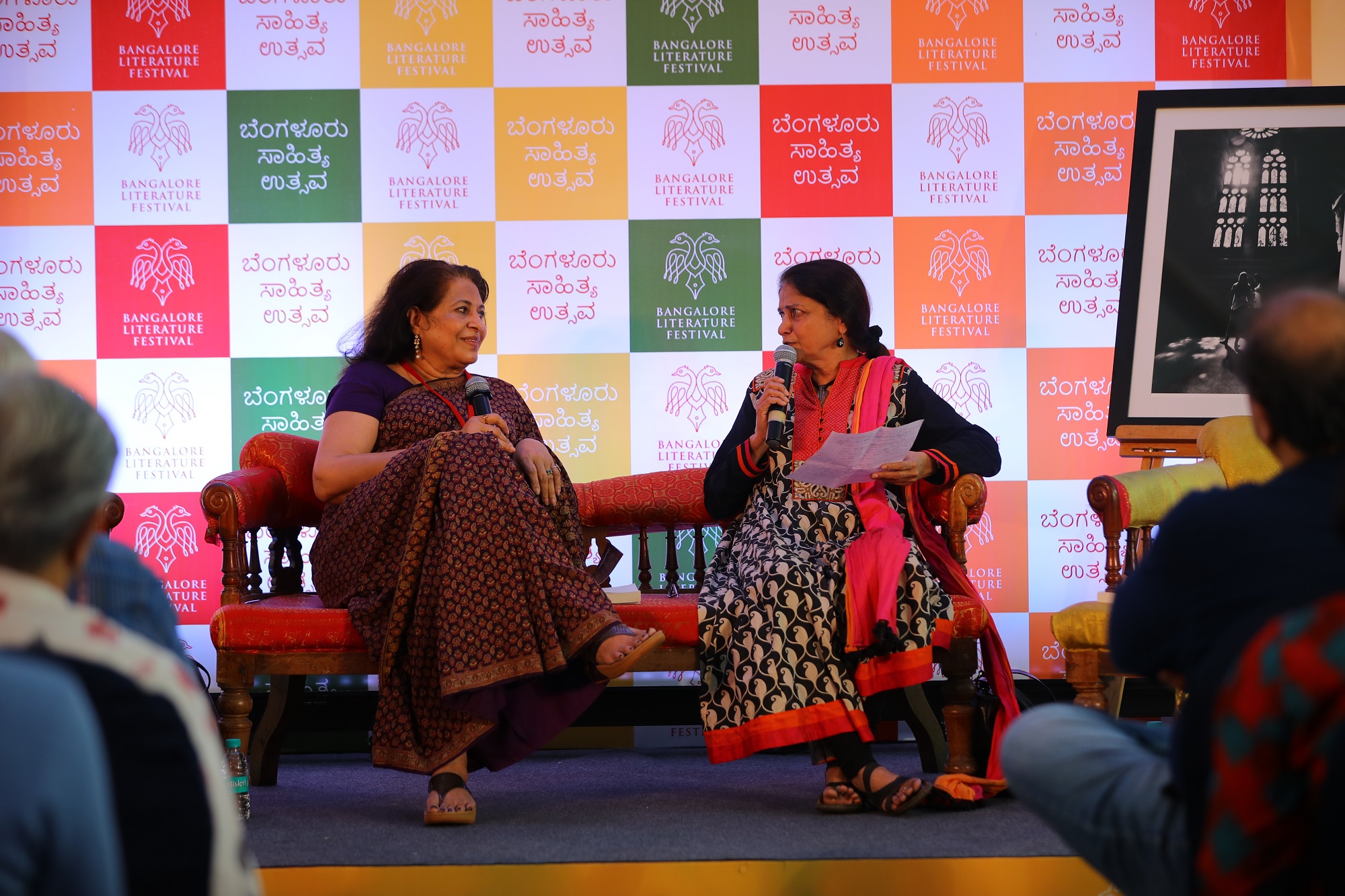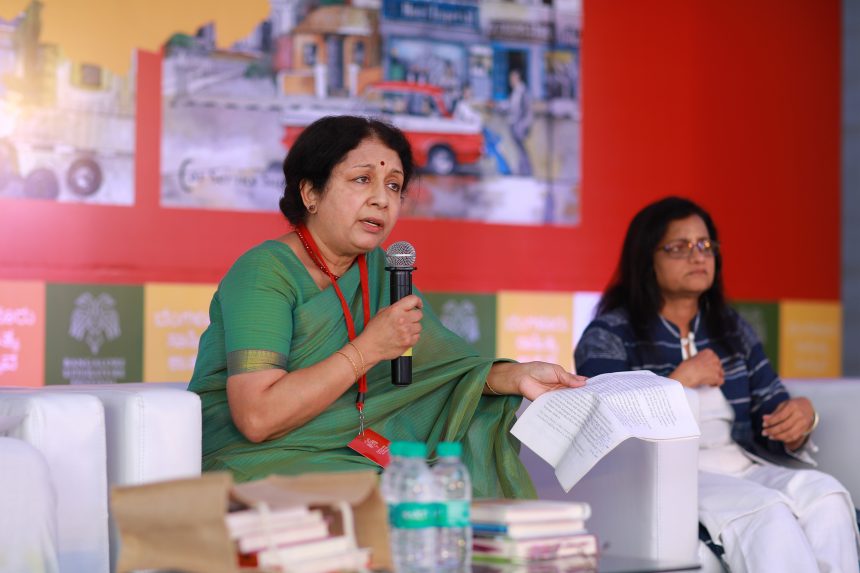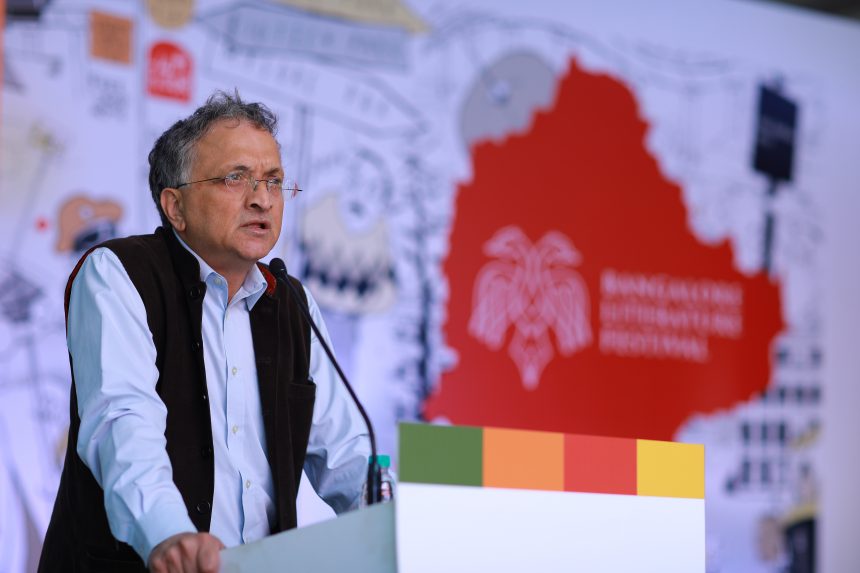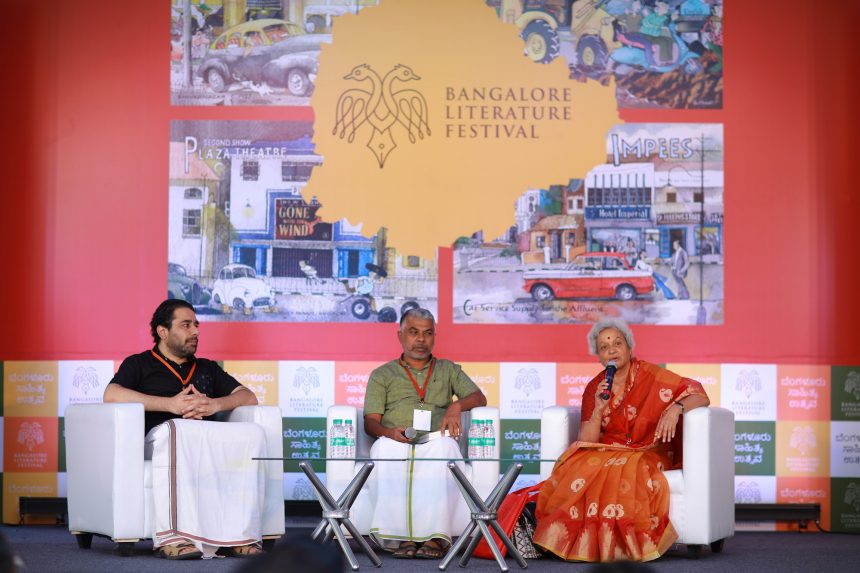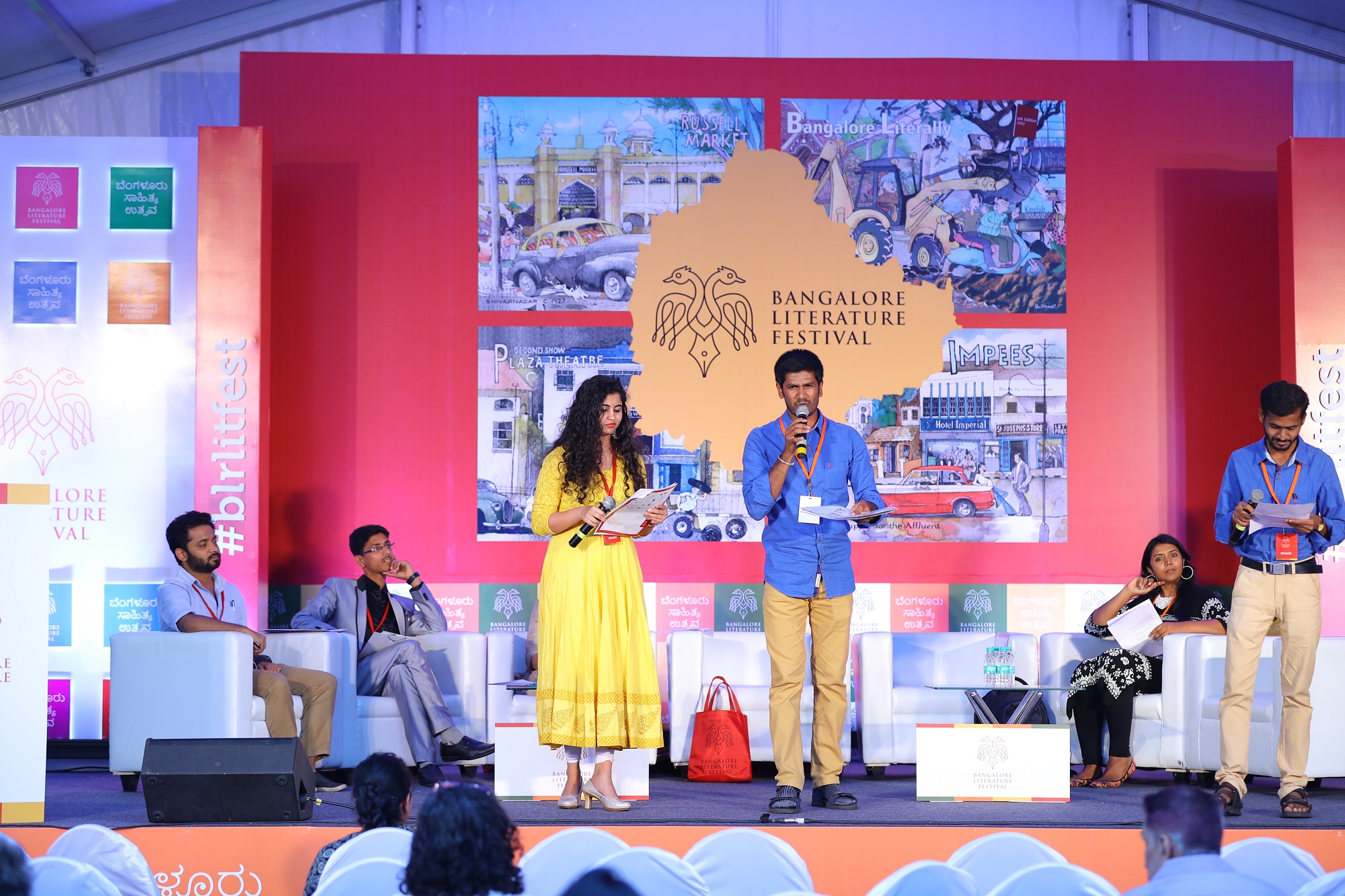The speaker of the house was Hannelore Vogt with Satish Hosamani, the former is the director of Cologne Public Library, Germany and the latter represented Karnataka State Libraries. The session started with Hannelore presenting us some articles which looked like toys and one would wonder about its significance, only to realise from her presentation that those were printed out from the 3D printer of Hannelore’s public library.
First Draft to Marketing – How to get Published
The author of ‘The Amazing Racist’, ‘Panther’, and ‘Loyal Stalkers’, Tenduf-La grew up in a bunch of cities that includes Hong Kong, London, Delhi, and Colombo. Through his own experiences, Chhimi Tenduf-La brings the nuances in the pursuit of getting a book published.
Continue reading “First Draft to Marketing – How to get Published”
The Family as a Microcosm
Bangaloreans got a chance to interact face to face with the renowned author Sadiqa Peerbhoy, who launched her latest book on the first day of Bangalore Literature Festival, 2017. ‘The Family as a Microcosm’ is the story of a dysfunctional family which is trying to survive through a distraught Bombay, post-Babri Masjid demolition. While both the family and the city are in turmoil, the author tries to portray how deeply the fate of both these two entities are intertwined. Whatever happens to the family, happens to the city and hence, the word ‘microcosm’ fits so aptly into the title.
Voyage of Words – Translators Set Sail
Antara Gange
Women who have been through the toughest of times that life has thrown at them, Indira Lankesh and Dr. Vijaya opened in this interaction with M S Asha Devi about what makes them the strong women they are. Indira Lankesh is the wife of Late P Lankesh and author of , ‘Sour Mango and I’ (autobiography), and Dr. Vijaya, the first woman journalist in Kannada, was the one who brought the International Film Festival to Bangalore. She also launched the intellectual magazine for women, ‘Namma Manasa’. M S Asha Devi, a feminist writer elicits the working of the minds of these women who embodied strength.
Jingoism Vs. Patriotism
Weekend mornings of an octoberish Bangalore can carry you into an inertia that is extremely difficult to overcome. However, this is a time loved and awaited by writers, poets, and patrons of literature for reasons transcending into the creative streak of such people. As such, this is perhaps the best time for a celebration like Bangalore Literature Festival to happen. When you have a Historian and Author as eminent as Ramachandra Guha to speak with you right in the morning, you can’t really ask for more. ‘Jingoism Vs. Patriotism’ has been a lingering debate for a long time in our society and has gained refreshed vitality in the recent times. Guha spoke on this subject. Continue reading “Jingoism Vs. Patriotism”
The City as a Protagonist
How often do we flow into the city and see it as a living, breathing space that weaves in memories? Imraan Coovadia, the author of five novels (‘The Wedding, ‘Tales of the Metric System’, to name a few), Suketu Mehta of ‘Maximum City’ fame, in conversation with Ravi Singh of ‘Speaking Tiger’ were in to discuss the workings of the city, and what these residents bring to help the cities thrive. Both authors bring in their experience of being in multiple cities in their lives, tracing it from their forefathers seeking to move out of their cities in India to cities elsewhere around the globe. Continue reading “The City as a Protagonist”
Whose Side are You On?
Two of the most prominent sports writers and columnists sat to deliberate on the ever-changing landscape of the game of cricket. As T20s shatter all records of sports viewership and fandom and the International cricket based on the idea of nation loyalties paves way for the domestic leagues of T20s, Gideon Haigh and Suresh Menon discussed the significance of modern cricket dynamics and the future of fandom in the session titled ‘Whose side are you on?’.
History of the Kannada Script and Language
Continue reading “History of the Kannada Script and Language”
சாதியும் நானும் – Caste and I
“Caste haunts you in the food that you eat. It might offer a moment of solace through community support. It might even offer you a god but there are more disadvantages to it”, says Ambai (C.S.Lakshmi) who has translated the Perumal Murugan’s ‘சாதியும் நானும்’ into English. The book is titled, “Caste and I” which was also the subject of discussion of conversation between Ambai, Perumal Murugan and the publisher Kannan Sundaram.
The book is an anthology of 32 essays written by people from 20 different castes. The original version in Tamil was released during the 50th meeting of Koodu in Namakkal. The contributors of these articles were not mainstream writers but students and other acquaintances of Perumal Murugan who have either been victims of casteism or have not had the courage to give up on casteism. The articles were personal experiences of these contributors.
Ambai talks about the various intriguing tales from the book which affected her greatly.
– A young boy from the lower caste who was not allowed to sit in the swirling chair of a salon because the hairdresser was afraid that his customers from upper caste will shun his salon for letting a lower caste boy sit on it.
– A dying patient who asked his doctor for his caste.
– A student who was mockingly called Rajiv Gandhi by his friends because he was provided with the Rajiv Gandhi scholarship for scheduled caste.
– A child from the lower caste who was given black coffee in a coconut shell because the dominant caste believed that serving milk to the lower caste would dry up the cow.
Ambai recollects how the courtesy of offering water to a guest when you enter a household in the rural Tamil Nadu was a subtle way of enquiring about her caste. Not just the rural area, even in the urban set up there indeed are people who refuse to rent out houses to Muslims and Dalits, added Murugan.
Perumal Murugan while talking about the book and the experiences that affected him says, it wasn’t an easy task to put the book together. People were hesitant to talk openly about caste and how it played out in their lives. But when they spoke about it eventually their worst fears came true. Some of them lost friends and relative severed ties with them. However, there were also good things that came out of it. When a friend from the upper caste wrote about how he could not bring his friends home because his family was against it and how small he felt about it, their friendship only got stronger. Some of them could take off their chest, the pain, humiliation and guilt that they had carried forever, by writing about it.
Perumal also talks about two essays that he wrote when his mother passed away. In one of the essays, he talks about his relationship with his mother and how she herself was a casteist. His mother did not approve of his marriage initially since it was an inter-caste marriage but did come to love her daughter in law later. But what shocked him the most was that even when her memory was slipping due to Parkinson’s disease she did not approve of the Dalit girl who was attending to her. Casteism is so deeply ingrained the blood of our people and we continue to pretend as if it does not matter. Ambai has translated these two articles into English and they were published in Sparrow.
He also remarks how even today there are different burial grounds and cemetery for different castes in the villages of Tamilnadu and how his mother insisted that he pay taxes to multiple villages to ensure she gets a burial ground. He also humorously adds that when his mother passed away it was the electric cemetery came to his rescue. When people ask him about where he has kept (buried) his mother, he continues to points to his heart.
Kaavya Sanje
Kaavya Sanje, or an evening of poetry is a regular event that was started in 2013. Sixteen editions later, the 17th was at Bangalore Literature Festival 2017. These evenings bring together various poets from across the cities who write in various languages. Poetry in Kannada, Hindi, Urdu, and English found their way this evening.
Indira
Journalist and News anchor, Sagarika Ghose’s book titled ‘Indira: India’s Most Powerful Prime Minister’, was published by Juggernaut Books to commemorate the 100th birth anniversary of Indira Gandhi. ‘Insecure daughter, Betrayed wife, National heroine, tough dictator’, reads the blurb for the book. Journalist, Political commentator and documentary filmmaker, Paranjoy Guha Thakurta too began his discussion with Sagarika on the same note. Continue reading “Indira”


